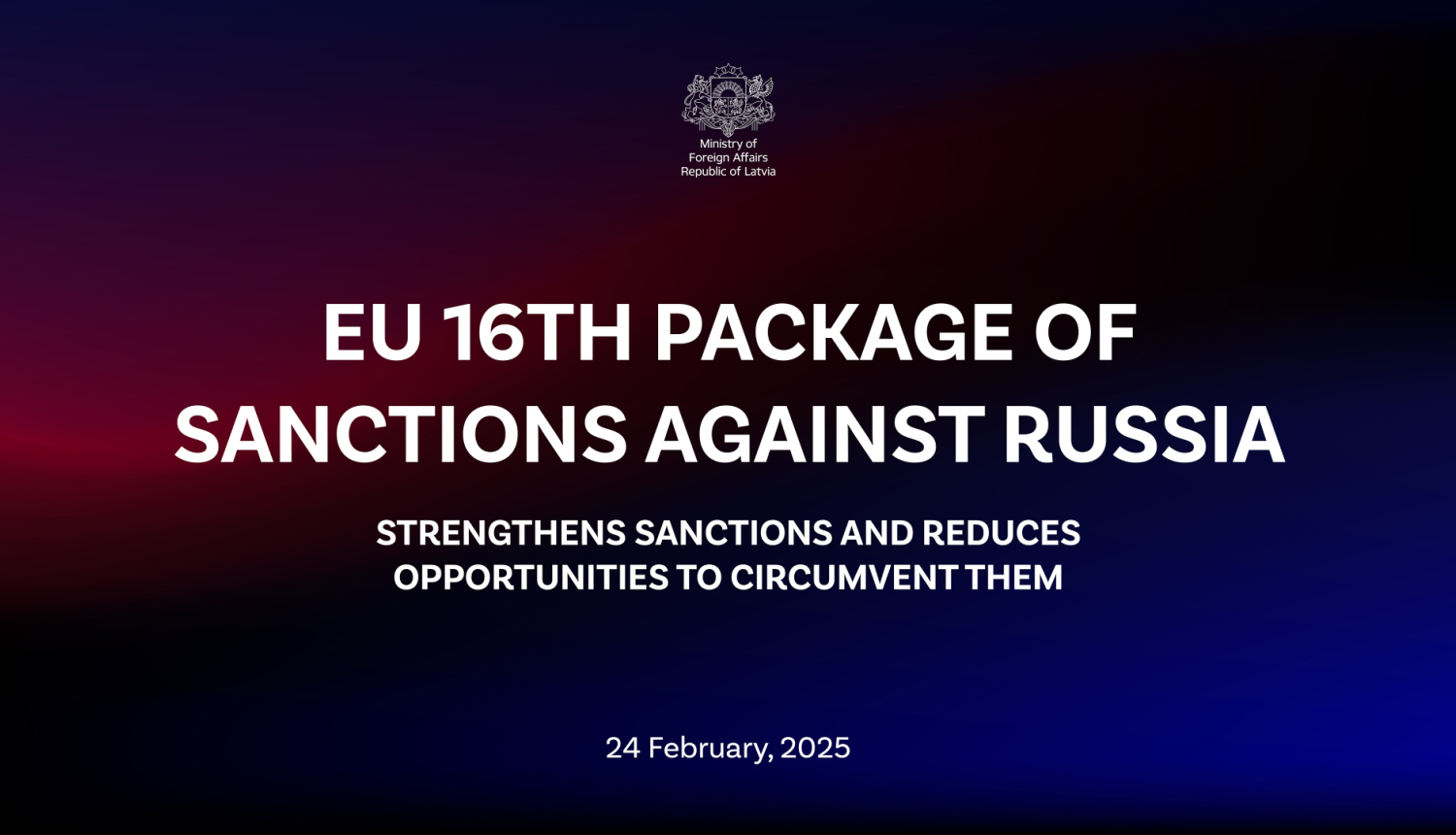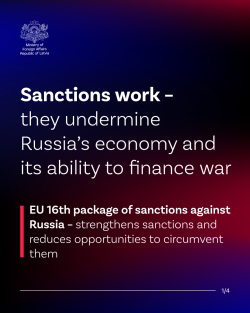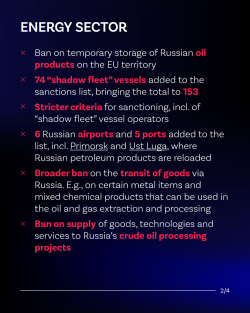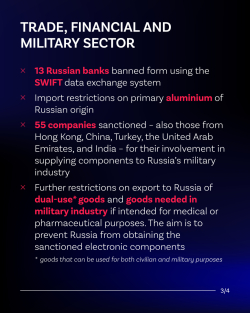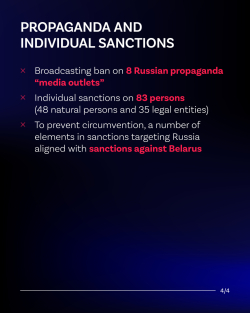Three years into the brutal war of aggression waged by Russia against Ukraine, on 24 February 2025, ministers at the European Union Foreign Affairs Council approved the 16th round of EU sanctions on Russia, reinforcing the restrictive and anti-circumvention measures. The package includes comprehensive and targeted sectoral measures to constrain Russia: prohibition of temporary storage of Russian petroleum products in the EU; a ban on EU imports of primary aluminium from Russia; a ban on export to Russia of dual-use goods and goods needed in military industry; 74 “shadow fleet” sanctioned, bringing the total to 153; 6 Russian airports and 5 ports added to the list, also Primorsk and Ust Luga, where Russian petroleum products are reloaded; 13 Russian banks banned from using the SWIFT system; suspension of broadcasting activities of 8 propaganda media outlets; 83 additional listings including 48 individuals and 35 entities; restrictions on 53 new companies (also from Hong Kong, China, Turkey, the UAE, and India) related to circumvention. To prevent circumvention, a number of elements in sanctions targeting Russia aligned with sanctions against Belarus.
The Parliamentary Secretary of the Ministry of Foreign Affairs, Dace Melbārde: “The EU Foreign Affairs Council takes place on the day that sees three years since Russia began its brutal war of aggression against Ukraine. Despite Russia’s lies and efforts to portray itself as a “dove of peace”, we are well aware of reality. Russian politics is war; Russia’s actions reveal its aggressive and imperialist nature and true intentions. A just and sustainable peace is certainly not in Russia’s best interests. We no longer have any time for discussion: rapid action is needed to provide sustainable military assistance to Ukraine, strengthen the industrial base for Europe’s defence and address capacity gaps. All of Europe and like-minded allies must make every effort to further undermine the already crumbling Russian war economy. A strong 16th round of sanctions has been adopted today, but more needs to be done. We must immediately seek the ways and legal solutions for the confiscation of all the immobilised assets of the Central Bank of Russia and channelling them in support of Ukraine. We exclude the possibility of lifting or relaxing sanctions against Russia even if a ceasefire is agreed in Ukraine.”
Ahead of the EU Foreign Affairs Council, the participating Foreign Ministers of the Baltic States and Nordic countries issued a joint statement to the media.
Dace Melbārde emphasised in the statement: The Baltic States have experienced Russia’s appetite being satisfied at our expense. We need to draw lessons from history. We must do more and do it faster so that Ukraine has better positions both on the battlefield and at the negotiating table.”
The EU High Representative Kaja Kallas opened the meeting with a moment of silence, concluded with the sounding of air raid sirens – exactly the kind used in Ukraine to alert people to yet another Russian attack. A Ukrainian flag belonging to one of the 36th Marines Brigade units was displayed in the hall during the meeting.
The EU Foreign Affairs Council officially approved a candidate proposed by Latvia for the post of the new EU Special Representative for Central Asia – Ambassador Eduards Stiprais. He will represent all the interests of the European Union in the region and will also work to strengthen EU-Central Asia cooperation in fields important to Latvia, including the security of borders and EU citizens, the fight against terrorism and illegal migration, and to reduce circumvention of EU sanctions against Russia. Eduards Stiprais is the first Latvian to be appointed as EU Special Representative.
In a discussion on the Russian aggression against Ukraine, the Council was joined by the Minister of Foreign Affairs of Ukraine, Andrii Sybiha (via videoconference), who pointed out: “Support for Ukraine is of an existential importance not only to Ukraine but also to Europe as a whole.” Ministers exchanged views on the need to increase military support to Ukraine and increase EU Member States’ investment in defence; they noted that a joint EU-level solution should be found to unlock EUR 6.6 billion assets under the European Peace Facility’s and strengthen the mandate of the EU Military Assistance Mission in support of Ukraine. The proposal to increase military support to Ukraine provides for the introduction of a new financial support mechanism that would work in a similar way to the European Peace Facility but would not replace it. It envisages the share of each EU Member State to be determined according to its current Gross National Income (GNI) per capita.
Dace Melbārde pointed out that Latvia will continue to provide military assistance of around 0.25% of GDP until at least 2026. She also noted that since 2023 Latvia has provided training to about 8,000 Ukrainian soldiers and that in 2024, Latvia supplied 5,000 drones worth EUR 15 million under the Drone Coalition (EUR 20 million planned for 2025).
In a discussion on transatlantic relations, Dace Melbārde underlined the need for a dialogue with the United States to be further developed, and for Europe, to demonstrate that it can be a strong, resolute and capable partner with a clear action plan and input. Europe must take the lead in terms of its security and defence by significantly increasing investment in defence and developing the military industry. She also emphasized that the Latvian Foreign Minister Baiba Braže is visiting the U.S. this week to, among other matters, deepen relations with the U.S., including within the NATO framework, regionally and bilaterally, as well as to expand economic cooperation.
In an exchange of views on the situation in Georgia, Dace Melbārde called for a coordinated EU action to support Georgian civil society and independent media, especially in the light of the suspended U.S. support. A principles-based position should be maintained vis à vis Georgian authorities, while also sanctioning those responsible for human rights violations. At the initiative of the EU High Representative Kaja Kallas, Member States will work to impose additional measures on the responsible Georgian officials; they also agreed to increase support for Georgia’s civil society and independent media.
The Council also discussed developments in the Middle East and the wider region, including in Syria and Lebanon. Ministers approved the lifting of separate sanctions in order to facilitate Syria’s reconstruction.
After a two-year break, the EU Foreign Affairs Council was followed by the 13th meeting of the EU-Israel Association Council. Dace Melbārde underlined: “We express solidarity with Israel and its people in the wake of the terrorist attacks by Hamas and Hezbollah, and we voice our concerns about the fate of hostages captured by Hamas. Latvia advocates for the unconditional release of all hostages taken by Hamas and an urgent access to humanitarian aid in Gaza. We hope for a permanent ceasefire in Gaza and Lebanon, and support from all the involved parties for its full implementation. At the same time, Latvia stands up for achieving a comprehensive, just and lasting peace, where two countries – Israel and Palestine – live side by side peacefully and within safe and recognised borders. This is essential for security and prosperity for Israel, Palestinians, and the wider region alike.”
At the Foreign Affairs Council, foreign ministers also discussed the drastic escalation of the conflict and the deteriorating humanitarian situation in the east of the Democratic Republic of Congo, where M23, a Rwanda-backed rebel group, continues its advancement since January 2025, capturing increasingly larger territories. Ministers considered possible EU measures to put pressure on those involved in the conflict.
Further information
- Opinion piece by Foreign Ministers of the Baltic States and Nordic countries: Now is the time for Europe really to step up on Ukraine
- EU Special Representatives contribute to the pursuit of EU policies and interests in specific regions and countries. In supporting the work of the EU High Representative for Foreign and Security Policy, Special Representatives have an active role to play in the EU’s efforts to consolidate peace, stability and the rule of law in non-EU countries. The EU currently has ten EU Special Representatives: for Bosnia and Herzegovina, Central Asia, the Horn of Africa, Kosovo, the Middle East Peace Process, the Sahel, the South Caucasus and the crisis in Georgia, the Belgrade-Pristina dialogue and other regional issues in the Western Balkans, and the Gulf States, as well as the EU Special Representative for Human Rights.
- The Foreign Affairs Council deals with matters relating to EU external action, including the common foreign and security policy, the European security and defence policy, external trade and development cooperation. The Council’s main role is to ensure the unity, consistency and effectiveness of the EU’s external action.




